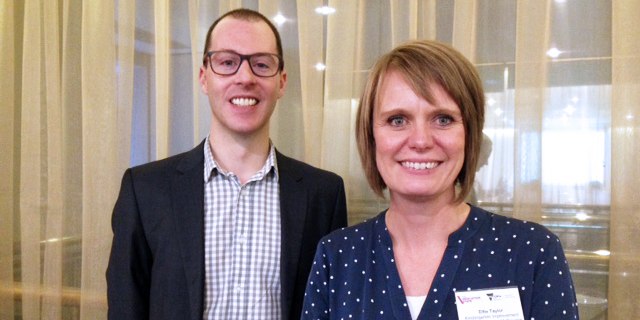Newly appointed DET staff are set to provi de enhanced support to the early years sector across 25 local government areas.
de enhanced support to the early years sector across 25 local government areas.
The Early Childhood Improvement Branches, to be made up of recently created early childhood specialist support roles and existing staff, will be up and running this month.
The branch brings together a dedicated team to support all early childhood education and care services. It is responsible for working with the sector on all Department-funded early childhood programs, including maternal and child health services, supported playgroups, Early Start Kindergarten, Best Start, kindergarten inclusion support, and early years management.
An emphasis for these branches will be supporting kindergarten providers and services to plan for and implement school readiness funding so that it has the greatest possible positive effect for children and families.
Elfie Taylor (pictured above with John O'Shaughnessy), Southern Melbourne area's new Kindergarten Improvement Advisor, says she is excited about her new role, having the opportunity to "support service providers around how best to build the capacity of the service, which will ultimately result in better outcomes for children".
With more than 22 years' experience in the early childhood sector, Elfie is excited to be working alongside kindergartens, to build strong relationships and assist them in planning, sector collaboration and innovation.
"I am very passionate about high-quality early childhood education and am thrilled to be an influential part in service planning and delivery so their programs give more children the chance to achieve their very best," she says.
The new branches will commence in Southern Melbourne, Inner and Outer Gippsland, Mallee, Wimmera South West and Brimbank Melton areas. These are the areas where services with funded four-year-old kindergarten programs will receive school readiness funding in 2019. They cover the following local government areas:
- Bass Coast Shire
- Baw Baw Shire
- Brimbank City
- Buloke Shire
- Cardinia Shire
- Casey City
- Corangamite Shire
- East Gippsland Shire
- Gannawarra Shire
- Glenelg Shire
- Greater Dandenong City
- Hindmarsh Shire
- Horsham Rural City
- Latrobe City
- Melton City
- Mildura Rural City
- Moyne Shire
- Northern Grampians Shire
- South Gippsland Shire
- Southern Grampians Shire
- Swan Hill Rural City
- Wellington Shire
- Warrnambool City
- West Wimmera Shire
- Yarriambiack Shire
The branches will progressively be established across the rest of the state over the next two years.
The new starters attended a two-day induction program in July, which brought together staff from the six new branches, with key regional and central colleagues and executives.
Q&A: Get to know your new regional staff
Elfie Taylor, Kindergarten Improvement Advisor, and John O'Shaughnessy, Manager, Early Childhood Improvement Branch, both from Southern Melbourne.
Who are you and what's your role?
ET: Hi, my name is Elfriede Taylor, but I usually get called Elfie. I have recently been appointed the Kindergarten Improvement Advisor (KIA) for the Southern Melbourne area. I will be supporting and capacity building funded kindergartens in the local Government areas of Casey, Cardinia and Greater Dandenong in implementing their school readiness funding.
JS: John O'Shaughnessy – Manager, Early Childhood Improvement Branch, Southern Melbourne.
What's your professional background?
ET: I have worked in the early childhood sector for more than 22 years. I have a bachelor qualification in early childhood education. I began my early childhood career in long day care as room leader and then as a director of a service. I then began worked in sessional kindergarten in Carrum Downs, where I remained for 15 years. In my last year of kinder teaching I worked for a Biala inclusive kinder program and also worked as a pedagogical leader for an early years manager. I have also taught various units of the Diploma of Early Childhood for Chisholm TAFE. I began working for the Department just over three years ago. I began as a Senior Authorised Officer in the Quality Assessment and Regulation team. In this role, I undertook assessment and rating visits as well as compliance visits. In March last year I took a secondment into the Early Childhood Performance and Planning Advisor (ECPAPA) role. In this role, I supported agencies and local government with their DET-funded early childhood programs such as Best Start, maternal and child health, Early Years Managers, ECIS and funded kindergartens.
JS: My background is in public health, education and policy.
How will you be supporting kindergartens?
ET: In my new role as a KIA, I will supporting kindergartens to choose how to best use their school readiness funding. This will involve supporting them in collecting and analysing data, such as AEDC data, and encouraging them to reflect on their community and the concerns and issues regarding children's development that are common for their cohort of children.
JS: My colleagues and I will be working exceptionally hard with kindergarten providers and a range of other program and service providers to identify and implement best practice and evidenced-based initiatives to improve outcomes for children and their families. For kindergartens, this includes the roll-out of school readiness funding to help children to get as much as possible out of their time at kindergarten.
What aspect of your new role are you most excited about?
ET: I'm very excited to be working alongside kindergartens and be able to meet and plan with them – and seeing the great results for children and families.
JS: I'm most looking forward to working with my colleagues, our partners and stakeholders as we positively influence the trajectories of young people engaging with the region's early childhood providers. Having worked on shaping elements of the Early Childhood Reform Plan in previous roles, I'm looking forward implementing and fostering one of the most ground-breaking and transformative policies we've seen in the early years sector.